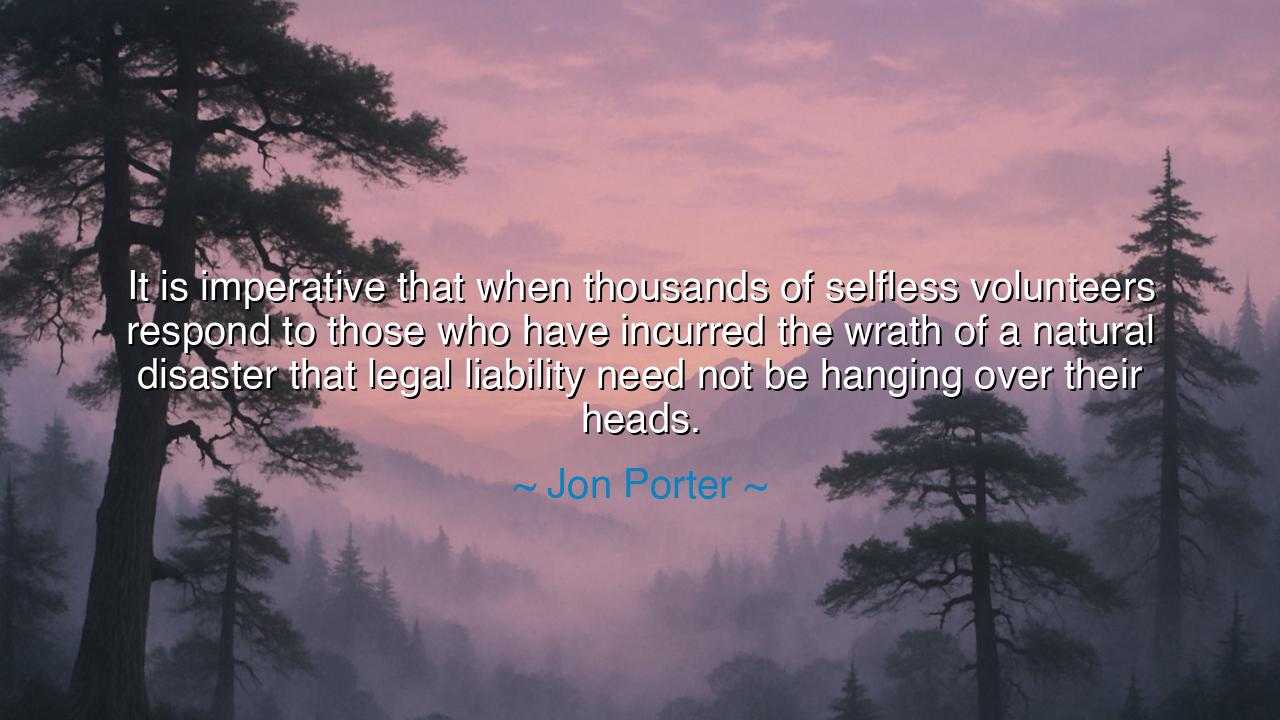
It is imperative that when thousands of selfless volunteers
It is imperative that when thousands of selfless volunteers respond to those who have incurred the wrath of a natural disaster that legal liability need not be hanging over their heads.






When Jon Porter declared, “It is imperative that when thousands of selfless volunteers respond to those who have incurred the wrath of a natural disaster that legal liability need not be hanging over their heads,” he spoke as one who understood the delicate balance between justice and mercy, between the laws that bind society and the compassion that sustains it. His words rise from the recognition that in moments of great calamity — when the earth quakes, when the seas rise, when fire devours the land — the noblest impulse of humankind is to help without hesitation. Yet that divine impulse, he warns, must not be strangled by fear of legal consequence, for when law hinders mercy, the very soul of civilization begins to falter.
The origin of this quote lies in the realm of public service and humanitarian response. Porter, a U.S. congressman, spoke in defense of volunteers and organizations who rush to aid the afflicted in times of natural disasters — hurricanes, earthquakes, floods, and fires — when chaos reigns and institutions tremble. He understood that such moments demand courage more than caution. And yet, the modern world, governed by intricate webs of liability and litigation, too often threatens those who act in good faith with punishment for unintended harm. His statement was thus both a plea and a warning: that the law must protect those who act selflessly, not ensnare them.
From the earliest days of civilization, the heroes of history have been those who rushed into danger while others fled. When the city of Pompeii was swallowed by the fire of Vesuvius, there were men who stayed to rescue the trapped; when plague struck medieval Europe, there were monks and healers who risked their lives to tend the dying. None of them sought reward — only to answer the silent command of the heart that says, help those who suffer. Yet, in later ages, as societies grew more cautious and the machinery of law more complex, the spirit of spontaneous charity found itself shackled by fear. The rescuer hesitated, not for lack of compassion, but for fear of being blamed. Porter's words stand as a shield against that fear — a reminder that goodness must not be punished for imperfection.
The “wrath of a natural disaster,” as he calls it, is a force beyond human control — an echo of the old world’s understanding of nature as divine, awe-inspiring, and merciless. In the face of such wrath, human beings become small again, reminded of their fragility. But they also become great again, for in crisis, the heart reveals its nobility. The volunteer is not compelled by law, but by love — not bound by contract, but by conscience. To burden such a one with legal peril, to make the giver of aid fear the consequence of his kindness, is to chill the flame of humanity itself. For when compassion pauses to calculate, its purity begins to fade.
Consider the story of Hurricane Katrina, when countless ordinary citizens — boat owners, doctors, teachers — rushed to rescue strangers stranded by the floodwaters. Many did so without training or official sanction, guided only by the instinct of mercy. And yet, some faced lawsuits afterward, accused of negligence in their desperate efforts. What lesson, Porter asks, does such punishment teach? That it is safer to stand aside than to act? That one’s duty is not to help, but to watch? If fear of law silences compassion, then law itself has lost its purpose — for the highest purpose of law is to serve life, not to stifle it.
Porter’s words are, therefore, not merely political; they are moral philosophy clothed in modern speech. They remind us of the ancient truth that law must bend before love when the two come into conflict. Even the wisest of ancient lawmakers, such as Solon or Cicero, taught that justice without mercy is tyranny, and order without compassion is hollow. In moments of great trial, when nations are shaken and the suffering cry out, the law must become a servant, not a master. The “imperative” he speaks of is not just legal reform, but spiritual reform — the cultivation of a society that values courage over caution, heart over hesitation.
The lesson for future generations is this: never allow fear of blame to silence the impulse to help. When the world falls into ruin, be among those who rise to rebuild it. Let your actions be guided by compassion first, and let the law follow your example, not hinder it. And if ever you hold power — in government, in law, or in life — remember that justice is strongest when it protects the good, not when it punishes the brave. For as Jon Porter teaches, in the darkest hour of disaster, humanity’s light depends upon those who act without fear — and upon a society wise enough to protect them when they do.






AAdministratorAdministrator
Welcome, honored guests. Please leave a comment, we will respond soon